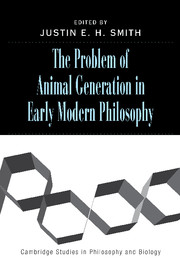Book contents
- Frontmatter
- Contents
- List of Contributors
- Introduction
- I THE DAWNING OF A NEW ERA
- II THE CARTESIAN PROGRAM
- III THE GASSENDIAN ALTERNATIVE
- IV SECOND-WAVE MECHANISM AND THE RETURN OF ANIMAL SOULS, 1650–1700
- 7 Animal Generation and Substance in Sennert and Leibniz
- 8 Spontaneous and Sexual Generation in Conway's Principles
- 9 Malebranche on Animal Generation: Preexistence and the Microscope
- 10 Animal as Category: Bayle's “Rorarius”
- V BETWEEN EPIGENESIS AND PREEXISTENCE: THE DEBATE INTENSIFIES, 1700–1770
- VI KANT AND HIS CONTEMPORARIES ON DEVELOPMENT AND THE PROBLEM OF ORGANIZED MATTER
- VII KANT AND THE BEGINNINGS OF EVOLUTION
- Bibliography
- Index
9 - Malebranche on Animal Generation: Preexistence and the Microscope
Published online by Cambridge University Press: 06 August 2009
- Frontmatter
- Contents
- List of Contributors
- Introduction
- I THE DAWNING OF A NEW ERA
- II THE CARTESIAN PROGRAM
- III THE GASSENDIAN ALTERNATIVE
- IV SECOND-WAVE MECHANISM AND THE RETURN OF ANIMAL SOULS, 1650–1700
- 7 Animal Generation and Substance in Sennert and Leibniz
- 8 Spontaneous and Sexual Generation in Conway's Principles
- 9 Malebranche on Animal Generation: Preexistence and the Microscope
- 10 Animal as Category: Bayle's “Rorarius”
- V BETWEEN EPIGENESIS AND PREEXISTENCE: THE DEBATE INTENSIFIES, 1700–1770
- VI KANT AND HIS CONTEMPORARIES ON DEVELOPMENT AND THE PROBLEM OF ORGANIZED MATTER
- VII KANT AND THE BEGINNINGS OF EVOLUTION
- Bibliography
- Index
Summary
INTRODUCTION
The theory of the preexistence of germs, either ovist or animalculist, was biological orthodoxy from the late seventeenth century to the end of the eighteenth. Although there were always dissenting voices, biologists of the calibre of Réaumur, Haller, Bonnet and Spallanzani lent the weight of their considerable authority to the theory – usually in its ovist version, which was generally considered to have superior empirical credentials, founded on a mass of observations of the development of eggs of various kinds. The rival theory of epigenesis seemed, to the orthodox biologists of the period, to require mysterious and occult powers or faculties and thus to be ruled out by the austere metaphysics of the mechanical philosophy.
In more recent times, the theory of preexistence has had a very bad press. It is generally derided as the product of speculative philosophy rather than of sober observation of and reflection on nature. In popular accounts of the history of biology, the ‘Russian dolls’ caricature of the theory of emboîtement is often introduced as a joke for the amusement of students. But if the theory was little more than speculative philosophy masquerading as empirical science, why did so many serious and sober biologists endorse it? The biologists of the period were all signed up – at least in principle – to the Baconian orthodoxy of the primacy of observation over theory. They must have been persuaded that the theory of preexistence had sound empirical credentials.
- Type
- Chapter
- Information
- The Problem of Animal Generation in Early Modern Philosophy , pp. 194 - 214Publisher: Cambridge University PressPrint publication year: 2006
- 2
- Cited by



